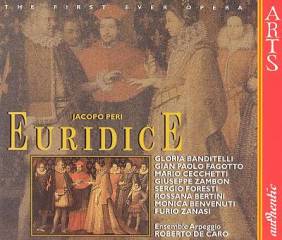Jacopo Peri – Euridice
Jacopo Peri – Euridice

CD 01 01 - Io che d'alti sospir (La Tragedia) 02 - Ninfe ch'i bei crin d'oro (Pastore del Coro) 03 - Raddoppia e fiamm'e lumi (Ninfa del Coro) 04 - Donne, ch'ai miei lamenti (Euridice) play 05 - In mille guise e mille (Euridice) 06 - Itene liete pur ( Coro) 07 - Antri, ch'ai miei lamenti (Orfeo) 08 - Sia pur lodato 'l Ciel (Arcetro) 09 - Nel puro ardor (Tirsi) 10 - O del gran Febo (Dafne) 11 - Per quel vago boschetto ( Dafne) 12 - Che narri ohime! (arcetro) 13 - Ahi morte invida e ria (Arcetro) 14 - Se fato invido e rio (Arcetro) 15 - Io che pensato avea (Arcetro) CD 02 01 - Se de' boschi (Coro) 02 - Scorto da immortal guido (Venere) 03 - Funeste piagge (Orfeo) 04 - Ond'e cotanto ardire (Plutone) 05 - Ahi, che pur d'ogni legge (Orfeo) 06 - O Re, nel cui sembiante (Proserpina) 07 - Dunque dal regno oscuro (Plutone) play 08 - Trionfi oggi pieta (Plutone) 09 - Por che gl'eterni imperi (Ombre e Deita d'Inferno) 10 - Gia del bel carro ardente (Arcetro) 11 - Come tanto dolor (Arcetro) 12 - Quand'al tempio ne andaste (Aminta) 13 - Gioite al canto mio (Orfeo) 14 - Modi or soavi or mesti (Orfeo) 15 - Biond'arcier che d'alto monte (Coro) Elena Barcis - Soprano Adele Bonay - Contralto Federico Davia - Baixo Giuseppe Donadoni - Baixo Rodolfo Farolfi - Tenor Adolfo Filistad - Tenor Franco Ghitti - Tenor Nerina Santini - Soprano Gastone Sarti - Barítono Karla Schlean - Soprano Coro Pilifonico di Milano Solisti di Milano Giulio Bertola - Choir Master Angelo Ephrikian – Conductor
Jacopo Peri (20 August 1561 – 12 August 1633) was an Italian composer and singer of the transitional period between the Renaissance and Baroque styles, and is often called the inventor of opera. He wrote the first work to be called an opera today, Dafne (around 1597), and also the first opera to have survived to the present day, Euridice (1600).
Euridice was first performed in Florence on October 6, 1600. The libretto by Ottavio Rinuccini is based on books X and XI of Ovid's Metamorphoses which recount the story of the legendary musician Orpheus and his wife Euridice.
Euridice was created for the marriage of King Henry IV of France and Maria de Medici. The composition is typically considered to be the second work of modern opera, and the first such musical drama to survive to the present day. (The first, Dafne, was written by the same authors in 1597.) Since both the libretto and score were dedicated to the new Queen of France, Marie de' Medici, some scholars have recognized a possible parallel between Euridice and Orfeo and the King and Queen of France. While the comparison is readily made, some scholars argue that the traits of King Henry IV are different from Orfeo, especially with respect to Orfeo's most famous deed. Orfeo loved Euridice so much that he journeyed to Hell and back, quite literally, to unite once more with his beloved wife while King Henry IV wouldn't travel as far as Florence to retrieve Medici.








